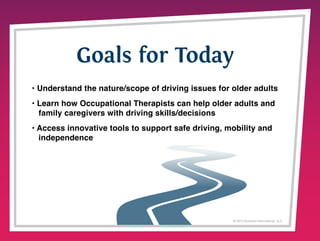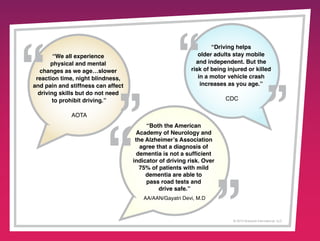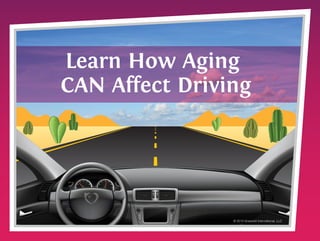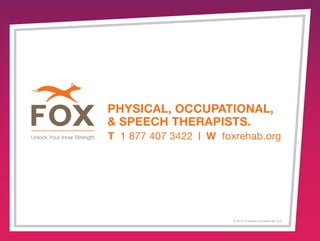Aging and Driving - Making Informed Decisions that Support Independence and Safety
- 1. Making Informed Decisions that Drive Independence and Safety © 2013 Griswold International, LLC
- 2. The Week of December 2nd is Older Driver Safety Awareness Week “AOTA's Older Driver Safety Awareness Week (December 2-6, 2013) aims to promote understanding of the importance of mobility and transportation to ensuring older adults remain active in the community— shopping, working or volunteering—with the confidence that transportation will not be the barrier to strand them at home.” The American Occupational Therapy Association © 2013 Griswold International, LLC
- 3. Goals for Today • Understand the nature/scope of driving issues for older adults • Learn how Occupational Therapists can help older adults and family caregivers with driving skills/decisions • Access innovative tools to support safe driving, mobility and independence © 2013 Griswold International, LLC
- 4. Presented by: Marv Lawson, OTR, DRS Director of Occupational Therapy Clinical Services Fox Rehabilitation – Cherry Hill, NJ Chris Kelly, MEd Director of Learning & Development Griswold Home Care © 2013 Griswold International, LLC
- 5. Thank you for your courage, energy, and dedication! Healthcare Providers Professional Caregivers Family Caregivers Older Adults © 2013 Griswold International, LLC
- 6. Orange Arrow Button: Minimizes or expands the GoToWebinar control panel. BRAIN WRITING Solutions Brainwriting is… • a fun, engaging way to brainstorm • sharing as many ideas as possible within a short timeframe Brainwriting Process • Listen for our questions • When prompted, enter your solutions using the webinar chat function • Don’t overthink or agonize…There are no right or wrong answers Brainwriting Outcomes • Peer-to-peer learning and sharing • A publication that benefits older adults Important • Avoid sharing any information that you would not want others to see © 2013 Griswold International, LLC
- 7. Lit Review Social Media Advocacy Solutions Webinar & Toolkit © 2013 Griswold International, LLC
- 8. A Complex Issue with Many Voices © 2013 Griswold International, LLC © 2013 Griswold International, LLC
- 9. “We all experience physical and mental changes as we age…slower reaction time, night blindness, and pain and stiffness can affect driving skills but do not need to prohibit driving.” “Driving helps older adults stay mobile and independent. But the risk of being injured or killed in a motor vehicle crash increases as you age.” CDC AOTA “Both the American Academy of Neurology and the Alzheimer’s Association agree that a diagnosis of dementia is not a sufficient indicator of driving risk. Over 75% of patients with mild dementia are able to pass road tests and drive safe.” AA/AAN/Gayatri Devi, M.D © 2013 Griswold International, LLC
- 10. “I am worried about my dad. He has had several ‘fender benders’ over the past year. There is always a good reason, but this never happened before. I am worried about his safety, and the safety of others. But it is so hard to bring this up.” “It is easy to say, ‘just give up the keys’. It is important for me to stay active, and if I don’t drive I am stuck in the house forever. I can’t live that way.” Quote from older adult driver Quote from family caregiver © 2013 Griswold International, LLC
- 11. Learn How Aging CAN Affect Driving © 2013 Griswold International, LLC
- 12. Aging CAN cause changes in… • Vision • Hearing • Coordination • Reflexes • Physical strength • Attention span • Reaction time • Memory • Judgment • Emotions (anxiety) • Medications – some can affect driving © 2013 Griswold International, LLC
- 13. Dementia CAN cause changes in… • Memory • Concentration • Coordination and reflexes • Ability to recognize the purpose of objects • Ability to read and respond to road/traffic signs Dementia & Driving Resource Center Family Conversations about Alzheimer’s, Dementia & Driving http://bit.ly/18GYYv3 http://bit.ly/17Q2fqy © 2013 Griswold International, LLC
- 14. Warning Signs for Unsafe Driving • Frequent "close calls” on the road • Confusing the two pedals • Finding dents and scrapes on the car/fences/mailboxes/etc • Having road rage • Getting lost, especially in familiar locations • Missing/misunderstanding traffic signals • Slow response to unexpected situations • Misjudging gaps in traffic • Causing drivers to honk or complain • Being easily distracted • Can’t turn around to check their blind spot • Receiving multiple traffic tickets or "warnings" • Can’t move foot from gas to brake pedal © 2013 Griswold International, LLC
- 15. Learn About Driving Assessments Occupational Therapists Can Help © 2013 Griswold International, LLC
- 16. The Role of the Occupational Therapist Experts who are trained to: • Educate about the effects of aging on driving • Evaluate driving skills • Evaluate the car for adaptive equipment needs • Plan for alternative forms of transportation • Support the older adult and their family caregivers Find a Driving Specialist Driving and Community Mobility Guidelines for Older Adults http://bit.ly/1e5L3q4 http://bit.ly/1f7xQcH © 2013 Griswold International, LLC
- 17. A Driving Assessment can include… • Medical and driving history • Vision and/or hearing • Cognition (memory, judgment and speed of response) • Motor function (strength, range of motion and flexibility) • Driving ability (online/on-road/simulation) What to Expect with Driving Assessments Self-evaluate Your Driving Skills: http://bit.ly/1j412XV http://bit.ly/1bCo4er © 2013 Griswold International, LLC
- 18. Should you take a driving course? http://bit.ly/1bMAhS6 http://bit.ly/JgE3s6 © 2013 Griswold International, LLC
- 19. Paying for Driving Specialists/Tests • Older adults typically pay out of pocket for driving assessments • Medicare and private insurance do not typically cover driving assessments costs • Average assessment cost ranges (may vary based on region) include: - Initial clinical assessment: $150-$200 - Full driving assessment: $200-$750 - One-hour driving rehab/lesson: $80-$150/hr. • Additional costs may be included for adaptive equipment Paying for a professional assessment: http://bit.ly/190gG2h © 2013 Griswold International, LLC
- 20. Develop Your Action Plan © 2013 Griswold International, LLC © 2013 Griswold International, LLC
- 21. Form your Safe Driving Care Team Your care team should include: Counselor Department of Transportation Advocacy/ Support Group Driving Testing Center Primary Care Provider (PCP) Geriatric Care Manager/ Social Worker Family and Friends Occupational Therapist/ Driving Specialist/ AOTA Area Agency on Aging © 2013 Griswold International, LLC
- 22. Consider Adaptive Equipment • Low-effort steering • Ribbon attached to seatbelt • Hand controlled breaks • Navigation system • Swing-out seat • Swivel Seat Cushions • Back-up camera • Extensions (Key, foot pedal, mirror, steering wheel) Equipment That Can Empower Drivers Car-fit.org http://bit.ly/1d8e3s4 http://bit.ly/18qBuPP © 2013 Griswold International, LLC
- 23. Improve/Maintain Driving Skills • Stay physically fit and active • Take a driving course: in-person, online, or simulation AARP driving courses: Staying active can help: http://bit.ly/1gwntmH http://bit.ly/19HWkW6 Exercise for mature drivers: http://bit.ly/18JJdXi © 2013 Griswold International, LLC
- 24. When Driving is No Longer an Option Overcoming anger, grief and depression © 2013 Griswold International, LLC © 2013 Griswold International, LLC
- 25. “Without driving, it has been found that individuals can risk social isolation, depression, and may lack a sense of control over their lives.” “When an older adult is given a traffic ticket or has a minor crash, it may feel like a natural time to discuss safety in driving… the problem is that this is when an older adult feels he or she must defend the ability to drive, and so the conversation with family members can, unfortunately, become argumentative.” Mary Jo McGuire MS, OTR/L, OTPP, FAOTA Peggy Barco, MS, BSW, OTR/L “Productive engagement (paid work, formal volunteering, and informal volunteering) was negatively affected when older adults stopped driving.” Angela Curl, PhD © 2013 Griswold International, LLC
- 26. Talk About It • Talk openly/respectfully about concerns/fears • Try 1-1 vs. large group discussions • Stick to the facts vs. assumptions/stereotypes • Be positive - assume driving may be an option • Allow grieving and anger Family Discussions http://bit.ly/1aVuCoo © 2013 Griswold International, LLC
- 27. Common Driving Cessation Emotions • Many older adults/caregivers go through stages of grief after “giving up the keys” ACCEPTANCE • Exploring Options • New Plan In Place • Moving On DENIAL • Avoidance • Confusion • Shock • Fear BARGAINING • Adjusting • Struggling to Find Meaning ANGER • Reaching Out to Others • Frustration • Telling One’s Story • Irritation • Anxiety DEPRESSION • Overwhelmed • Helplessness • Hostility • Flight http://www.ekrfoundation.org/five-stages-of-grief/ © 2013 Griswold International, LLC
- 28. Coping with Emotions • Allow time for grieving • Join a support group • Talk about your feelings • Seek counseling • Fight back! – “when one door closes….” © 2013 Griswold International, LLC
- 29. Learn About Other Ways to Get Around • Public transportation • Family or friends • Walking • Taxi • Grocery stores that deliver • Community shuttle buses • Trips with places of worship • Non-medical home care • Adult day care Finding Transportation Services For Seniors http://bit.ly/Jy6YYZ © 2013 Griswold International, LLC
- 30. Key Takeaways • Aging can affect driving skills • Many older adults are safe to drive • Occupational therapists can help to assess driving challenges and recommend solutions • Older adults who stop driving are at risk for developing depression and isolation • It is important to consider alternate forms of transportation when driving is not an option © 2013 Griswold International, LLC
- 31. Open Q&A 1. Click to expand if necessary 2. Type questions here © 2013 Griswold International, LLC
- 32. © 2013 Griswold International, LLC
- 33. Brought to you by: Griswold Home Care offers access to affordable non-medical care options to assist your loved one. CareAssure Screening System™ The Griswold Golden Rule: We only approve caregivers we would trust in our own homes. Extraordinary Home Care at Affordable Rates Since 1982 QuickCare Placement™ We give each family access to the most experienced caregivers available. ValueCare Commitment™ Simple Rates. Unmatched Value. Our allinclusive rates are among the most affordable. National 24x7 Care Line: 800-GRISWOLD www.GriswoldHomeCare.com © 2013 Griswold International, LLC
































